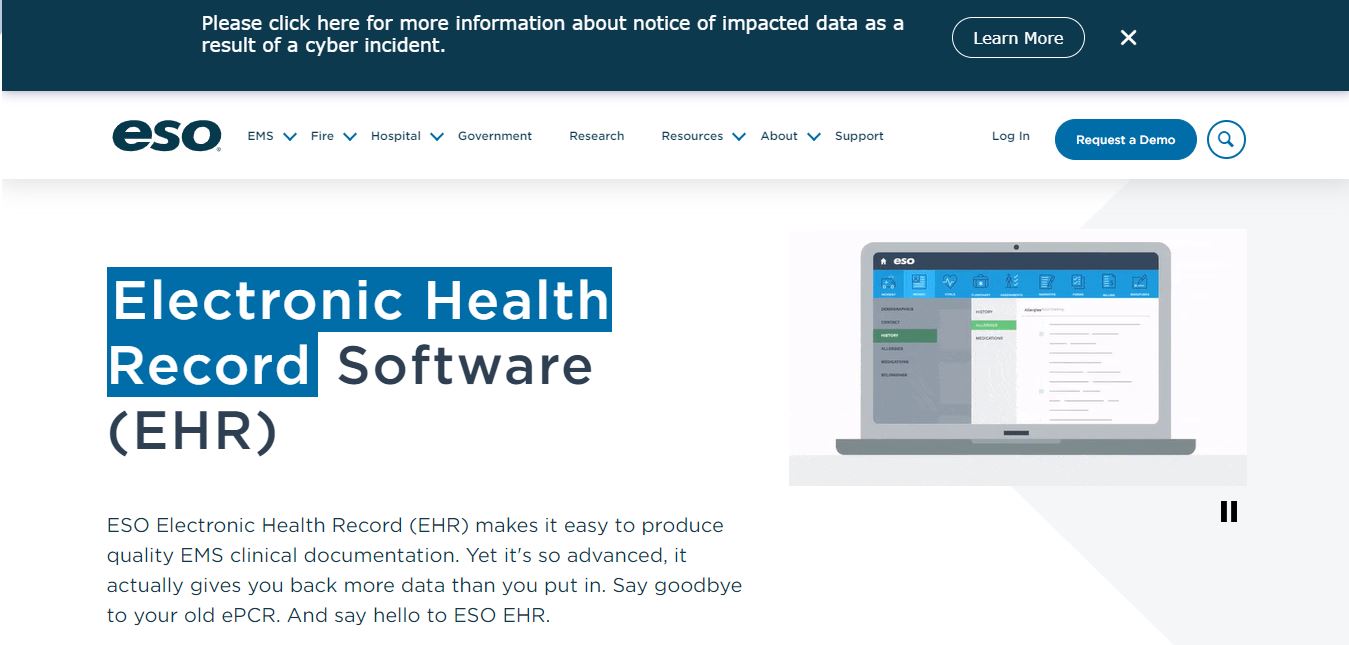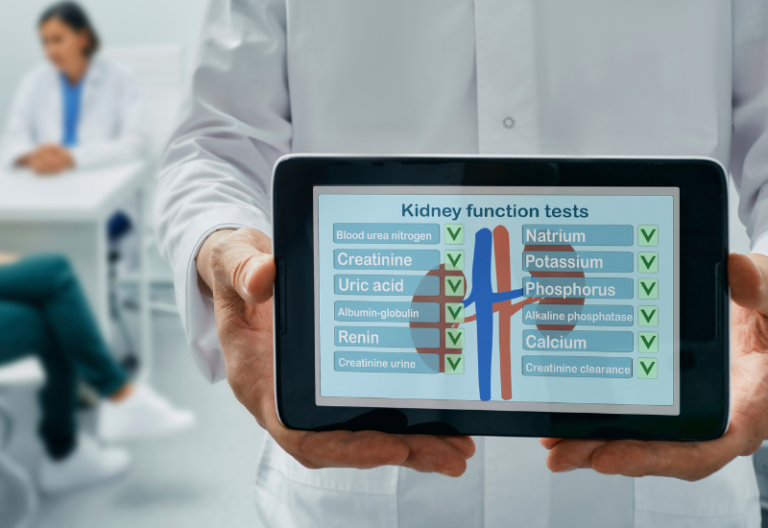ESO EHR helps health practitioners document medical notes accurately and provides the references you need to decide on patient care. Read on to know if the platform is suitable for your practice.
This article explores ESO EHR’s features, pricing, and more.
Table of Contents

What Is ESO EHR?
ESO EHR is a web-based electronic health record (EHR) system with built-in documentation, reference, and data analytics tools, helping providers make better patient care decisions in real time. With powerful analytics features, the EHR system helps produce accurate and insightful Emergency Medical Services (EMS) clinical documentation.
ESO EHR was developed by ESO, a US-based software and data solutions provider to emergency EMS agencies and fire departments. An insightful interview on EMS1 shows that the company was birthed when its founder, Chris Dille, saw the discrepancies within the emergency response system. Once a patient is delivered to the hospital, emergency first responders typically don’t get updated on patient outcomes or the accuracy of their diagnosis. Dille found a way to improve patient care in emergencies through its products ESO EHR and ESO Health Data Exchange for EMS (ESO HDE).
ESOHealth EHR Software Features
Data Analytics
EMS Analytics software is an award-winning platform included with the ESO EHR. You don’t need to pay an additional fee to analyze your data. The analytics platform simplifies data, provides prebuilt reports, and allows you to customize your reports. With this powerful data analytics tool, ESO EHR helps you use data to monitor your practice’s performance and make data-driven decisions.
Documentation
Providers can easily search for a patient’s medical records through ESO EHR. You can view their medications, allergies, medical history, and other health information through an easy-to-understand dashboard.
Specialty patient forms
ESO EHR provides various patient form templates to help you collect specialized data. Specialty patient forms include those for cardiac arrest, stroke, ST-segment elevation myocardial infarction (STEMI), overdose, and more. You can use these templates as reference tools for accurate recording of health data.
Quality Assurance and Improvement reviews
The QA/QI review feature improves your EMS service’s evaluation and operational performance. ESO EHR includes a Quality Management module, which helps you assess the effectiveness of healthcare delivery, identify areas of improvement, enable secure communication among crews, and review EHRs for billing and clinical purposes.
Handtevy integration
ESO EHR integrates with the Handtevy System, a platform for rapid response pediatric and adult emergency care. It gives healthcare providers access to lifesaving medical dosing, equipment, drip information, CPR Assist, and documentation tools.

Billing and claims verification
The ESO EHR billing feature frees you from revenue management tasks. The platform helps you create customized billing workflows, receive alerts for delayed payments, and ensure that claim submissions contain complete and accurate billing information. You can also connect billing with ESO Payer Insight and ESO HDE to access hospital-generated billing information.
QuickSpeak translation tool
QuickSpeak, which won the EMS WOrld 2011 Top Innovation Award, is language translation software for the EMS industry. It allows you to communicate with non-English speaking patients in seven languages. The tool contains 400 close-ended questions categorized into 20 groups focusing on specific aspects of assessment and treatment.
Touch screen support
Unlike the old electronic Patient Care Report (ePCR), which is also a digital health record, ESO EHR features support for touch screens. You can conveniently use your fingers to activate features when you’re in a hurry without using a stylus.
Quicktreats
This feature allows you to quickly record a patient’s health data, including basic vitals, treatments, common medications, and CPR treatments. Moreover, it sends alerts to receiving hospitals when a patient is being transported. You only need to enter patient demographics, select the destination, and the type of healthcare alert (stroke, sepsis, etc.). Emergency departments can track patients via the ESO Patient Tracker, a free feature for hospitals.
Signature capture
Collect signatures quickly using the signature capture feature on the ESO EHR system. This feature directs patients to the signature field and helps them avoid accidentally hitting the wrong button when signing, which usually happens for elderly patients.

How Does the ESO EHR System Work
ESO EHR is web-based software. Setting up physical hardware or downloading an app is unnecessary. Subscribe to the service, get familiar with the system, and enter your data. Update the information with each patient encounter and access this data anywhere through your computer device.
ESO EHR Pricing, Free Trial, and Free Version
The price of ESO EHR is available upon request. Capterra shows that the software starts at $1000 per user per year. However, it’s best to get in touch with the ESO team for current pricing and to get an accurate quote based on your practice’s requirements.
A free trial and free version aren’t available, so requesting a demo to see the platform yourself is the best way to get a firsthand experience. On its website, you will need to fill out the online form with your name, company, and contact details. Once you supply the necessary information, the ESO EHR team will get back to you and set up an appointment.







